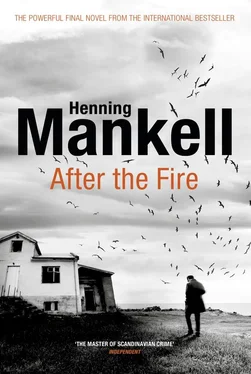‘It’s always the same with the French police,’ he said. ‘You can never get any sense out of anybody.’
‘So Louise isn’t here?’
‘The French police often lose people, but of course we’re not giving up. I expect the Swedish police are the same.’
After yet more confused conversations and various junior officers running in and out, it seemed that Louise had been at the station, but earlier that morning she had been transferred to a custody suite on the Île de la Cité. Armand was unable to tell us why. He drank cup after cup of strong black coffee; as he grimaced at the temperature of the liquid, I saw that he had bad teeth, which made me feel slightly nauseous. Olof Rutgersson showed great tenacity, insisting that he wanted to know why Louise had been moved and what exactly she was accused of. He didn’t get any answers. The van that had collected her and a number of other individuals who were under arrest had taken all the paperwork.
‘Was she with anyone else?’ I asked.
Rutgersson passed on the question, but no one could tell us whether Louise had known any of those who had been arrested at the same time.
It took half an hour, with Rutgersson getting increasingly annoyed, before he realised there was no point in staying in Belleville. When we left the police station, he wanted something to eat, so we went to a nearby cafe while the chauffeur waited in the car. I drank tea while Rutgersson had coffee and a sandwich.
My phone rang; it was Lisa Modin. Rutgersson listened discreetly to our brief conversation.
‘The girl’s mother?’ he asked.
‘She’s dead. That was a friend.’
‘I’m sorry. I didn’t know you’d lost your wife.’
‘We weren’t married, we just had a daughter together.’
As we left Belleville, the traffic heavier now, Rutgersson went back to making calls and sending texts. He wore a wedding ring on his left hand. I tried to picture his wife but without success.
I was waiting for Lisa to call back. I hadn’t been able to work out whether she was already in Paris. The thought of sharing a room with her, lying right next to her, sometimes drove Louise out of my head completely. I was too old to have a guilty conscience. I didn’t want to end up like my father. As he got older and was plagued with severe joint pain, he began to brood about the people he had treated badly or bullied during his lifetime. Even though he had been just as shabbily treated by unpleasant maître d’s and toffee-nosed customers, it was as if he was determined to spend the time he had left atoning for his sins.
I remember one occasion just after my mother’s death when I went to visit him in the small, dingy apartment in Vasastan. I had recently qualified as a doctor, and had taken my stethoscope and blood pressure monitor with me to show my father that I was now able to check those aspects of his health that he constantly worried about.
I stayed the night, going to bed early because I had to be at the hospital in the Söder district the following morning. My father had a tendency to wander late at night. He had spent so many years as a waiter that he rarely went to bed before three o’clock in the morning.
I suddenly woke up without knowing why. The door of my bedroom was ajar, and I could hear my father dialling a telephone number. I wondered who he was calling at this hour. I got out of bed and crept over to the door; I could see him sitting there with the receiver pressed to his ear. When he didn’t get an answer, he gently replaced it and crossed off a name on the handwritten list in front of him.
He was asleep when I got up in the morning. I looked at the piece of paper by the telephone; it was a list of names, people I didn’t know. Next to some of the names he had made a note that the person in question was dead. There were also various telephone numbers followed by a question mark.
The next time I visited him, I asked him about the nocturnal calls. Who was he ringing? Who were the people on his list? He told me without hesitation that they were people he thought he had mistreated during his life. Now, before it was too late, he wanted to call them and apologise. Unfortunately many of them had already passed away, which he found very difficult to deal with. I wondered whether that was why he had started neglecting his clothing; he no longer bothered to change if there were stains on his shirts or trousers.
He died six months after our conversation. I have no idea how many of those on the list he managed to speak to by then, but I kept it when I cleared his apartment. It had been in my desk drawer ever since, until my house burned down. Now it was gone for good.
We drove across the bridge to the Île de la Cité and found the address we had been given. Olof Rutgersson brandished his diplomatic pass like a crucifix, and within no time we had tracked down someone who would be able to tell us where Louise was. A female preliminary investigator called us into her spacious office, which I was surprised to see contained a grand piano, a Bechstein. She asked us to sit down and opened the file in front of her on the desk. She turned to me because I was Louise’s father, but Rutgersson immediately took over; he was the one who wanted answers to our questions. The woman, who was wearing a wine-red skirt suit and had a small burn mark on one cheek, spoke just as quickly as Rutgersson. I had no chance of following the conversation. I had begun to change my opinion of Rutgersson; he seemed to be taking his task extremely seriously. He was not indifferent to what had befallen Louise after all. From time to time he interrupted the Frenchwoman, and gave me a brief summary of what was being said.
Eventually the picture became clear. Louise had been arrested after stealing a wallet from someone’s inside pocket on a crowded Metro train near Saint-Sulpice. It appeared that she had been taken to Belleville, which was some considerable distance away, because the local custody facilities were already full. There was no doubt that she had stolen the wallet. The elderly victim hadn’t noticed anything, but a fellow passenger had seen exactly what Louise had done and had grabbed her. It turned out he was a civilian employee of the French police.
There was no evidence that anyone else was involved, but she probably hadn’t been working alone.
Louise had been arrested and would be formally charged. According to Rutgersson, over the past twelve months the French police had made a point of tackling the increase in muggings and the large number of pickpockets operating in Paris, which had almost become like Barcelona, the pickpockets’ European paradise. When I asked him to find out if it would be possible to let Louise off with a caution because she didn’t have a criminal record in France and was pregnant, the French officer merely spread her hands wide. It seemed unlikely that Louise would be released any time soon.
‘Can’t they just fine her?’ I asked.
‘It’s too early to discuss any kind of penalty,’ Rutgersson replied. ‘The most important thing right now is to see her and hear her version of events.’
‘The most important thing is that she knows we’re here,’ I said. ‘Everything else is secondary.’
A uniformed officer led us through corridors, down stairs and passageways, moving deeper and deeper underground. I began to wonder if this really was the place where I had been held when I was picked up by the police in 1968. I thought I recognised the whitewashed vaulted cellar, the steel doors, the wooden benches, the distant sounds of people shouting to one another. The place was a maze; you could get lost at any moment and never find your way out.
Eventually Rutgersson and I were shown into a windowless room with a dark-stained wooden table and a few rickety chairs. We waited, Rutgersson with a kind of exaggerated calm, while I became more and more agitated. Then the door opened and Louise was brought in by a female officer. She was wearing her own clothes, a pair of trousers and a shirt I recognised. She was very pale. For the first time I could remember she looked pleased to see me. She usually regarded me with some degree of caution, but not this time.
Читать дальше












